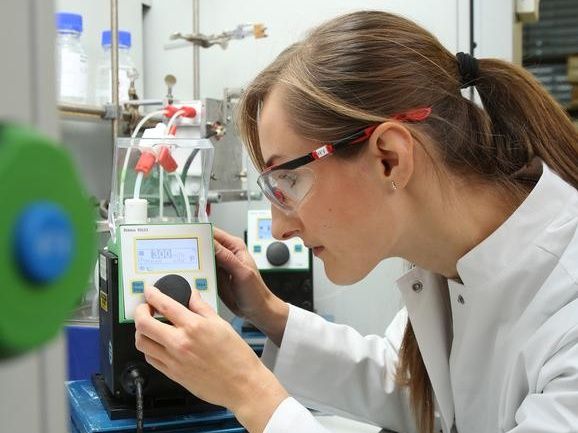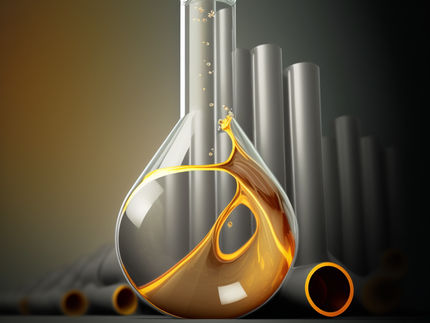Sustainable recycling using electrochemistry: Carl Zeiss Foundation supports new research project
New Halocycles project aims to develop a halogen recovery technique contributing to the stabilization of the power grid and the defossilization of the future industrial society
Increasing the recovery of valuable fossil raw materials, avoiding climate-damaging carbon dioxide emission, and stabilizing our energy supply network – these are the three major objectives of a new joint research project of Johannes Gutenberg University Mainz (JGU) and TU Kaiserslautern. With their pioneering concept, the two partners convinced the Carl Zeiss Foundation (CZS) to fund their project in its CZS Breakthroughs program with around EUR 4 million over the next six years. In the new Halocycles project, the researchers aim to develop an electrochemical technique to recover halogens – such as bromine, chlorine, and fluorine – from waste products. The carbon structure present in halogen compounds will be preserved in the process, thus preventing the corresponding emissions, while the flexibility of the technique will help contribute to the stabilizing of power grids.

A researcher working on an electrochemical flow reactor
photo/©: Alexander Sell
Previous methods of recovering halogens from compounds were highly complex and unsustainable
Halogen compounds are present in a wide range of everyday products. Polyvinyl chloride (PVC), for example, is used in various construction materials, while polytetrafluroethylene (Teflon) is employed for non-stick coatings or in batteries. It is difficult if not impossible to find alternatives to them because they often have unique properties. Unfortunately, the halogens most in demand – fluorine, chlorine, bromine, and iodine – are becoming increasingly expensive, while in some cases resources are growing scarce. Recycling is difficult. Where it is at all possible, halogens have to be recovered from the flue gases generated by burning the corresponding waste, meaning large amounts of energy are required. To exacerbate the problem, many halogen compounds are also used in flame retardants so that the burning process requires assistance by additional gas or oil. This results in the disintegration of the carbon structures and thus the release of large quantities of carbon dioxide. "In our new Halocycles project, we are approaching this issue a completely different direction," said Professor Siegfried Waldvogel of JGU's Department of Chemistry, who is the project's spokesperson. "Our idea is to use an electrochemical technique to recover the halogens without burning the carbon structures. Thus, we also avoid the formation of dioxins." The results then form the basis for a circular economy of halogens.
Outstanding expertise in the field of electrochemistry at Mainz University
It is possible, for instance, to power the electrosynthesis process using renewable electricity generated by wind turbines at night when there is less demand of electricity. This would thus also assist with the stabilization of energy supplies. "We here at Mainz do have a great understanding of the process of electrosynthesis. We have been working in this field for 25 years now and have gained a level of expertise that only few in the world can match," emphasized Waldvogel. Involved in the project in addition to the Mainz-based researchers at JGU and the Max Planck Institute for Polymer Research are their colleagues at TU Kaiserslautern providing their know-how in chemistry and process engineering as well as those at the Leibniz-Institut für Verbundwerkstoffe GmbH (IVW), also based in Kaiserslautern. The partners also consider to utilize and exploit the results of research in a spin-off to be established later on in the process.
The researchers anticipate that among the outcomes of the Halocycles project will be a more effective use of resources and a reduction of the dependence on Earth's dwindling fossil reserves. This may well help pave the way towards raw materials sovereignty in Europe, a very important topic now and in the future.
Organizations
Other news from the department science

Get the chemical industry in your inbox
By submitting this form you agree that LUMITOS AG will send you the newsletter(s) selected above by email. Your data will not be passed on to third parties. Your data will be stored and processed in accordance with our data protection regulations. LUMITOS may contact you by email for the purpose of advertising or market and opinion surveys. You can revoke your consent at any time without giving reasons to LUMITOS AG, Ernst-Augustin-Str. 2, 12489 Berlin, Germany or by e-mail at revoke@lumitos.com with effect for the future. In addition, each email contains a link to unsubscribe from the corresponding newsletter.
Most read news
More news from our other portals
Last viewed contents

NAGY Messsysteme GmbH - Gäufelden, Germany
Nanotechnology in the focus of consumer health protection - Around 200 participants in the sixth BfR Consumer Protection Forum
DSM to build fifth Dyneema yarn production line




























































